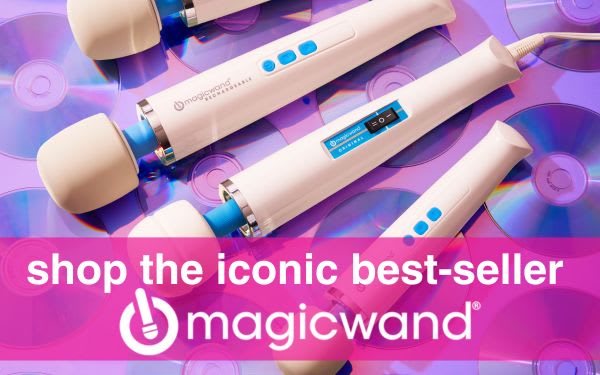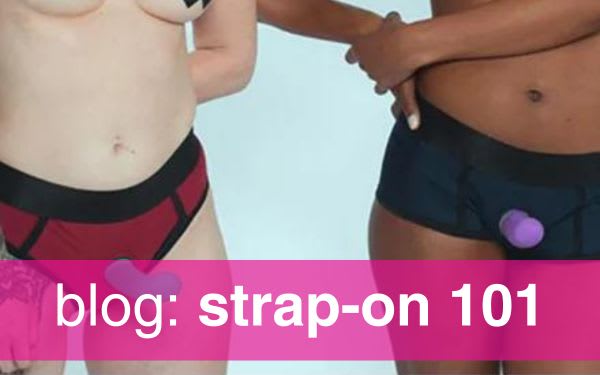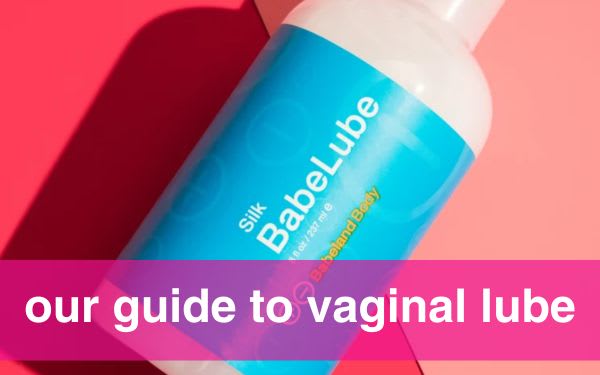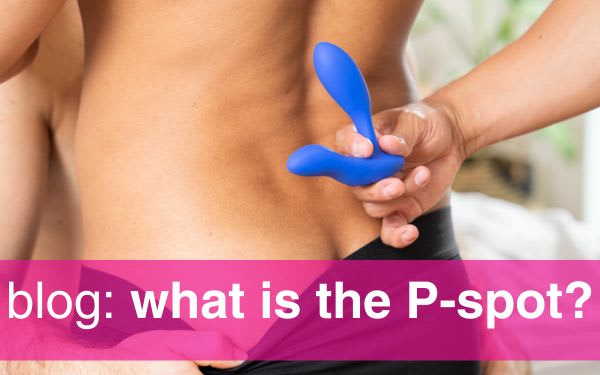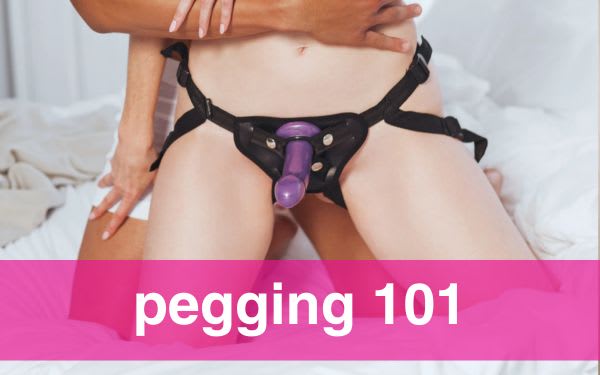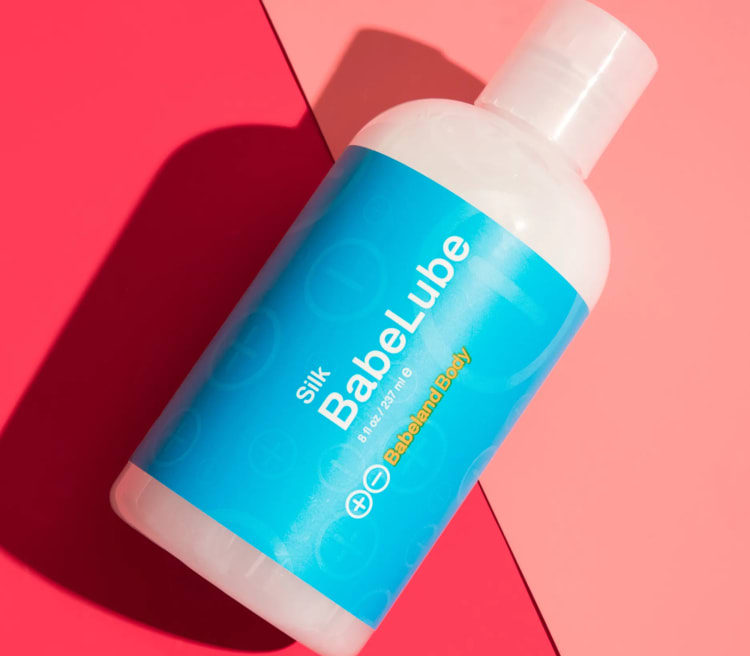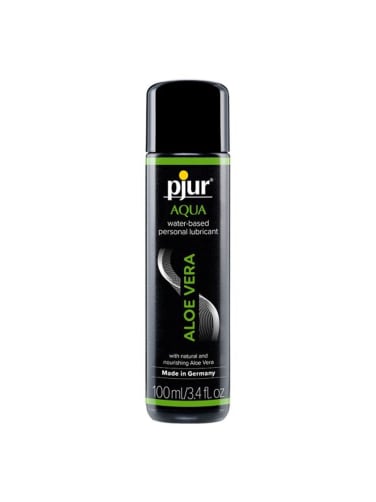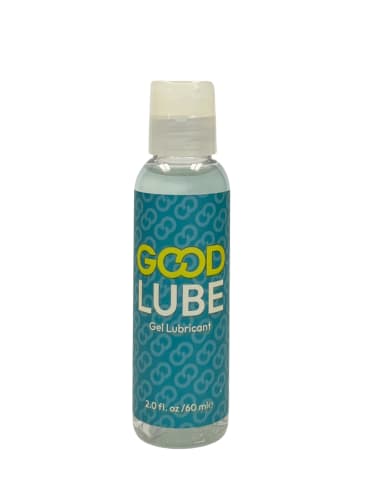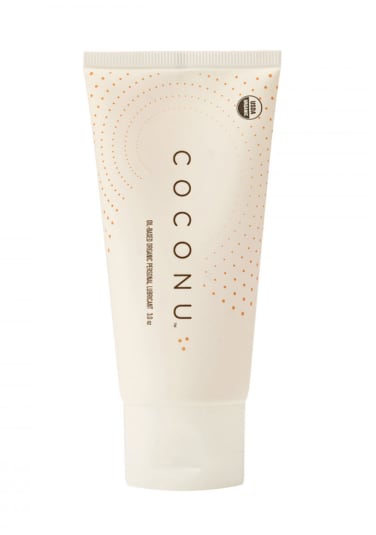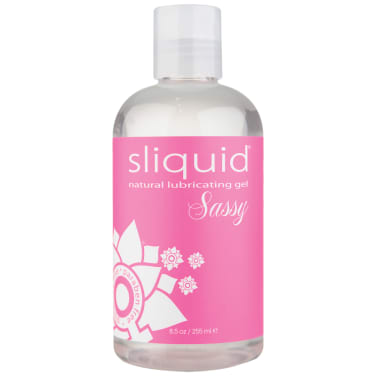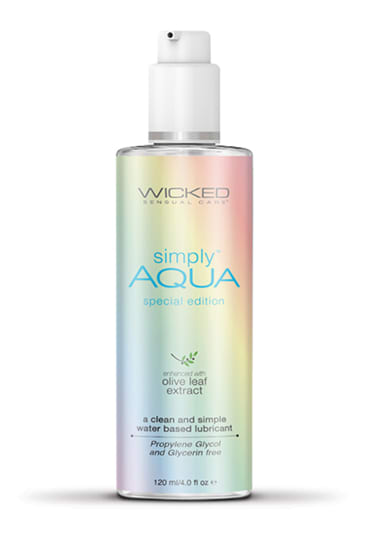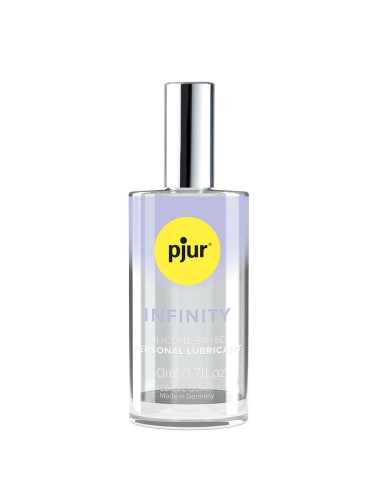Everything You Need to Know About Vaginal Lubricants: A Comprehensive Guide
When it comes to vaginal sex and penetrative play - whether we’re talking P-in-V (penis in vagina), strap-on / dildo play, fingering, using an internal vibrator, or anything that involves insertion - there’s one simple yet totally game-changing tip that our sex educators love to share: use lube.
Unfortunately, there’s still quite a bit of stigma around using lubricant for vaginal sex, and a lot of confusion about which lubricants are best for vaginas - fortunately, we’re here to help debunk, demystify, and get you hype about the wonders of lube.
What are Vaginal Lubricants?
Vaginal lubricants are lubes designed to safely and comfortably be used during penetrative vaginal sex. These lubes are limited on ingredients to help protect the sensitive environment of the vaginal canal, and to help hydrate and lubricate the vaginal walls and prevent vaginal dryness for more comfortable and more pleasurable sexual activities.
Is lube important? Do I even actually need it?
Before we move forward, I wanna do a little mythbusting- since, as a sex educator, I can’t tell you how many times I’ve heard some version of the question “why do you need lube if your partner turns you on?” The answer is actually super simple: arousal does not always mean wetness.
There’s a lot of shame and stigma around not getting “wet enough” - the idea that you aren’t turned on enough, that your partner isn’t doing it for you, that you’re broken - but that isn’t the case. In fact, you can be more horny than you’ve ever been in your life and still not have a drip of natural lubrication, and that’s perfectly normal. There are so many reasons why someone can have a harder time getting wet that have nothing to do with how much you want it - maybe you’re on an SSRI or other medication that’s affecting you, maybe you have a condition that affects your mucous membranes, maybe you’re experiencing hormonal changes via menopause or birth control, maybe your body is changing with age, maybe you’re close to your menstrual cycle or just finishing it, maybe you drank too much liquor or coffee, maybe you’re simply not hydrated enough.
Using a personal lubricant is not something shameful - in fact, lube is a tool that any of our staff educators will recommend to anyone, whether or not they’re experiencing any vaginal dryness, and for all different kinds of sexual activity and play. Even if you feel like you may not need lubricant, there's a good chance that you'll still want to use it! Let’s talk about why:
How Lubricants can Help
The vaginal walls are coated in a mucous membrane, not unlike the tissue inside your mouth on your cheeks. They contain layers of tissue with many elastic fibers and rugae, the texture which allows the vagina to expand during sex. It’s essential for these walls to stay hydrated and moist in order to allow that movement and expansion to happen comfortably, especially if you're someone who experiences vaginal tightness.
Think of it almost like opening up your mouth real wide when your lips are dry - there’s gonna be pulling and tugging at the chapped skin that’s not gonna feel great, which is why so many folks will reach for some chapstick to help moisturize the mouth and make that movement easier. Lubricant does just that - it hydrates the membrane and keeps it nice and wet even with all of the friction that happens during penetrative sex so that you can enjoy the sexual pleasure of the sensations you want to be feeling instead of irritation and pulling.
Different Types of Vaginal Lubricants
The world of lubes is a wonderfully vast one. Since our bodies, tastes, and the ways that we play are so unique, it only makes sense for there to be a variety of types of lubricants so that you can find the right fit for you and the way that you experience your sexual pleasure.
Water-Based Lubricants
Water-based lubricants are the little black dress of lube. Simple, smart to keep around, and a great fit for all types of occasions.
Pros of Water-Based Lubricants:
✅️ Compatible with any type of toy material
✅️ Safe to use with latex and non-latex barriers like condoms and dental dams
✅️ May be a better fit for those with sensitivities
✅️ Comes in all different consistencies from thin liquids to thick and cushiony gels
Cons of Water-Based Lubricants:
❌ May absorb into the skin more quickly than other lubricants and need to be reapplied more frequently
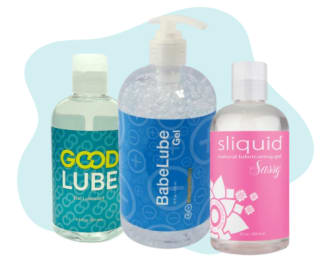 Our product recommendations
Our product recommendations
Silicone-Based Lubricants
Silicone is the most popular option for body-to-body play, and is often the kind of lube you’ll find on pre-lubricated condoms.
Pros of Silicone-Based Lubricants
✅️ Safe to use with latex and non-latex barriers like condoms and dental dams
✅️ Has a slick, thin texture that a lot of folks find appealing
✅ ️Long-lasting
Cons of Silicone-Based Lubricants
❌️ Not compatible with most silicone toys and silicone-blend / TPE toys
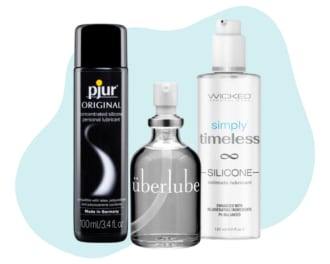 Our product recommendations
Our product recommendations
pjur Original Silicone Lubricant
Wicked Simply Timeless Silicone
Oil-Based Lubricants
Oil-based lubes are super popular for their naturally derived ingredients and the benefits of botanicals they may contain, but use caution if you’re using a safer sex barrier.
Pros of Oil-Based Lubricants
✅ ️Often contain botanical and/or organic ingredients
✅ ️Has a slick, thin texture
✅️ Long-lasting
Cons of Oil-Based Lubricants
❌ Not compatible with many safer sex barriers
❌️ Harder to clean
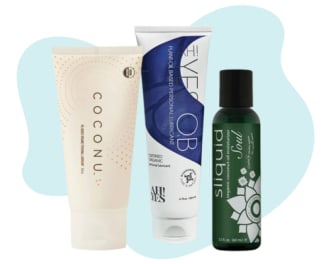 Our product recommendations
Our product recommendations
Ah! Yes OB - Natural Plant-Oil Lubricant
Hybrid Lubricants
Hybrid-based lubes - sometimes called cream or silk lubricants - are mainly water-based but have a small amount of silicone in them as well to extend longevity while still being safe to use with toys.
Pros of Hybrid Lubricants
✅️ Silky, lotion-like feel
✅ Compatible* with any type of toy material (*as long as it is properly cleaned off after use)
✅️ Safe to use with latex and non-latex barriers
✅️ Longer lasting than water-based lube
Cons of Hybrid Lubricants
❌️ Some customers dislike the creamy, opaque appearance (it kind of looks like c*m - which could also be a fun thing, tbh)
❌ Not as long-lasting as silicone or oil
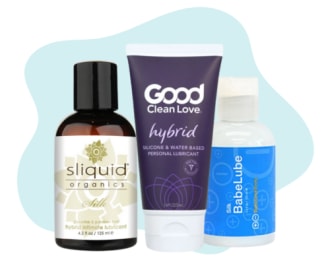 Our product recommendation
Our product recommendation
Good Clean Love Hybrid Lubricant
Choosing the Right Lubricant for You
Things to Consider When Choosing a Lubricant
First question: If you're exploring vaginal penetration, what are you using? Are you exploring with an internal toy like a G-spot vibe or dildo? Are you playing body-to-body with fingering or P-in-V? Are you using a condom and need to avoid oils? Is your toy made of silicone?
Second: Are there any other traits or features that you want your lube to have? Do you want botanicals for extra moisturizing properties? Do you want a stimulating lubricant to add in some extra sensation? How about a thicker, gel-like lube to add some extra cushion to your play?
Vaginal Lubricant Ingredients to Know
Keep in mind that every body is different, so while one person may absolutely love how a certain ingredient feels on their body, it may not be the right fit for someone else (think of lube like skincare!) Though plant-based and organic ingredients have a great rep for all of their benefits, if you are a person who is super sensitive or is prone to irritation, opt for less ingredients. Oh, and if you have a food allergy or sensitivity to the plant the ingredient is derived from, don't use it during sex either.
Also note that the mucous membrane of the vaginal canal is unique from other parts of the body, so while we may recommend certain lubes for other activities (flavored lube for oral play, stimulating lube for external play, stroking cream for handjobs), not all lubricant is created equal when it comes to internal sexual pleasure.
Ingredients we love:
- Botanicals are ingredients directly derived from plantlife. Folks that are looking for less chemical-based ingredients in their lubricant keep an eye out for this word along with “natural” and/or “organic”.
- CBD is the non-psychoactive ingredient in cannabis plants (it has no affect on your mental state and will not get you “high”). CBD lubes can promote physical relaxation, pain relief, and help with tension that may be a result of chronic conditions.
- Aloe vera* is a botanical known for soothing, moisturizing, and skin-repairing properties. Aloe also has a very slick natural texture that mimics the natural lubrication of the vagina.
- Almond oil* (commonly sweet almond oil) and sunflower seed extract both moisturize and soothe sensitive skin, and have a delightful light scent to it. Don’t use if you or your partner have a nut allergy.
- Coconut oil* and avocado oil are also great for moisturizing and hydrating, and have a long-lasting slickness to keep things wet even after you’re going for a while. Just keep in mind that these oils may not be compatible with certain vaginal pH levels, so pay attention to your body.
- Green tea acts as an anti-inflammatory, which can help reduce discomfort for folks that experience conditions like vaginismus or endometriosis.
- Carrageenan has been linked in some studies to preventing HPV transmission.
- Vitamin E is an emollient and helps to hydrate and condition the skin, which can help with repair of the vaginal walls and to promote natural lubrication.
*We recommend these ingredients as they’re found in sexual lubricants and personal lubricants. We do not recommend using skin lotion or cooking oils for sexual activity. If you’re having sex, always opt for something created for sex!
Chemicals to avoid:
- Spermicides like nonoxynol-9 are designed to kill sperm to help prevent pregnancy, but can be irritating and even harmful to the vaginal mucosa. (Babeland doesn’t carry any spermicidal lubes or condoms for this reason).
- Petroleum products, like petroleum jelly (brand name Vaseline) are common DIY grabs for external play like handjobs, but they should not be used as lubricants inside the body, in the vagina or anus.
- Parabens such as propylparaben and methylparaben are sometimes used in lubricants as a preservative ingredient, but they have the potential to impact human hormones and can even lead to health complications, so they are another ingredient that we do not carry.
- Glycerine* is a sugar alcohol that can be irritating or increase risk for yeast infections when used vaginally.
- Polyethylene and propylene glycol are humectants, solvents, and thickeners that may be damaging to the mucosa in some cases.
*There are safe glycerine alternatives, such as ethylhexylglycerin which is a synthetic compound derived from grains and plants, is chemically different from glycerin / are glycerine-free, and may be used as a alternative preservative to parabens.
Lubricants and Sex Toys
If you can’t already tell, we’re pro-lube no matter what kind of penetrative play you’re enjoying - but lube can be especially beneficial when it comes to using certain materials. One of the most popular sex toy materials is medical grade silicone, which often has a bit of a grippy texture to it - so using lubricant with your sex toys can significantly improve your experience by cutting down on some of the pull that material can have and allowing for your toy to glide against all the spots you want to stimulate in a way that keeps all the good sensations at the forefront.
Best Practices for Using Lubricants with Toys
Because sex toys don’t have any naturally occurring moisture like skin does for body-to-body play, don’t be shy about being generous with your lube usage. Put the lubricant onto the insertable end of the toy, and if you want more slickness, feel free to put some directly onto your body in addition to that. If your toy has an external piece as well - like a dual-stim or rabbit vibrator - make sure that the clitoral piece is well-lubricated, too.
What Not to Do When Using Lubricants with Sex Toys
Remember, silicone lubricant and silicone toys don’t play nicely together, as the liquid silicone can mess with the texture of the solid silicone over time, and you want to keep your toys well cared for to get the longest lifespan possible from them! Always opt for a water-based or hybrid lubricant for silicone toys, and save your silicone-based lubes for your body-to-body play or hard material toys like metal, glass, and hard plastic.
If your toy has any openings, like for a charger or battery compartment, avoid getting lubricant near those gaps / spaces. Always clean your toy after use to get off any residual lubricant or bodily fluids to keep your toys sanitary - here’s our Babe Blog 101 all about properly cleaning your sex toys.
How to Use Vaginal Lubricants Safely
Once you know what you’ll be using your lubricant with and for, as well as what ingredients you’re interested in (and which lubricant ingredients to avoid), it’s time to play.
Using Lubricants for the First Time
If you have a sensitive body or are prone to irritation, spot-test your lubricant on your body first - this way if you have a reaction, it’s not on the more delicate tissue of the vaginal walls or the vulva. Take a pea-sized amount of lubricant and rub it in a circular motion on a patch of skin that’s not the genitals (I recommend thigh or forearm). Leave the lubricant there for at least a half-hour - if you experience any irritation, discomfort, burning, or other negative reactions, rinse the area with water and choose a different lubricant for your play, taking note of the ingredients.
When you’re ready to play, pop some lube onto whatever is going to be penetrating you - fingers, penis (even if you are using a lubricated condom, some extra won’t hurt), sex toy, etc - and if you want additional glide, you can apply some directly onto your own body as well. Keep your bottle of lube nearby so that you have it handy for re-application if you want.
Cleanliness and Lubricants
All of the lubricants that we offer at Babeland are completely body-safe (and only need to be rinsed with water if there is residual lube that you want to get rid of). Like said above, we highly recommend that you thoroughly clean your toys after each use, especially because you don’t want any leftover lube to trap any unwanted bacteria onto the surface - or other debris like pet fur or dust - as it dries.
Water-based lubricant is most commonly non-staining and will dry without leaving any marks, but some oil and silicone-based lubricants can stain. To remove lubricant stains from bed sheets or clothing, try using a damp cloth with a drop of dish soap on it before tossing it in the laundry - or get yourself a set of sheets or a blanket specifically designed to get covered in whatever liquids your sexy times lead to so you don’t have to worry.
